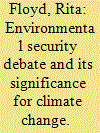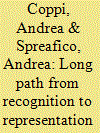|
|
|
Sort Order |
|
|
|
Items / Page
|
|
|
|
|
|
|
| Srl | Item |
| 1 |
ID:
083715


|
|
|
|
|
| Publication |
2008.
|
| Summary/Abstract |
Policymakers, military strategists and academics all increasingly hail climate change as a security issue. This article revisits the (comparatively) long-standing "environmental security debate" and asks what lessons that earlier debate holds for the push towards making climate change a security issue. Two important claims are made. First, the emerging climate security debate is in many ways a re-run of the earlier dispute. It features many of the same proponents and many of the same disagreements. These disagreements concern, amongst other things, the nature of the threat, the referent object of security and the appropriate policy responses. Second, given its many different interpretations, from an environmentalist perspective, securitisation of the climate is not necessarily a positive development.
|
|
|
|
|
|
|
|
|
|
|
|
|
|
|
|
| 2 |
ID:
083714


|
|
|
|
|
| Publication |
2008.
|
| Summary/Abstract |
Climate change has taken centre stage in European and international politics. Since the second half of the 1980s, the EU has established itself as an international leader on climate change and has considerably improved its leadership record. The Union has significantly enhanced both its external representation and its internal climate policies. However, implementation and policy coherence, coordination of EU environmental diplomacy, an evolving international agenda, EU enlargement, and a still precarious EU unity remain major challenges. Shifts in underlying driving forces and advances of EU domestic climate and energy policies nevertheless support the expectation that the EU will remain a progressive force in international climate policy for some time.
|
|
|
|
|
|
|
|
|
|
|
|
|
|
|
|
| 3 |
ID:
083713


|
|
|
|
|
| Publication |
2008.
|
| Summary/Abstract |
The Bush administration has been too quick to dismiss containment as an obsolete hangover of the Cold War. Appropriately modified to operate through international institutions and regional alliances, containment provides the most viable available basis for responding to terrorist threats emanating from rogue regimes and weak states.
|
|
|
|
|
|
|
|
|
|
|
|
|
|
|
|
| 4 |
ID:
083716


|
|
|
|
|
| Publication |
2008.
|
| Summary/Abstract |
Since the late 1980s, research on political Islam has been much in vogue in Europe and the US. This phenomenon is typically viewed as an expression of religion rather than of politics. Precisely because of the assumed "religious" underpinnings of political Islam, most Western attempts to engage with Islamists often remain trapped in an attempt to test their "democratic credentials". By focussing on what Islamists think about democracy, many studies have ignored the political, social and economic contexts in which Islamists operate. Accounting for the political underpinning of Islamist movements can both help understand their political evolution and open up fruitful avenues for comparative analysis. For this reason, attention is turned to Europe to seek best practices of external engagement with domestic opposition movements in authoritarian contexts, such as Western engagement with opposition actors in Franco's Spain, Kuchma's Ukraine and Shevardnadze's Georgia.
|
|
|
|
|
|
|
|
|
|
|
|
|
|
|
|
| 5 |
ID:
083718


|
|
|
|
|
| Publication |
2008.
|
| Summary/Abstract |
The Muslim community in Italy does not benefit from official recognition, which could, among other things, provide it with access to state funding. Nor does its fragmented nature favour a process of aggregation leading to the formation of a single representative body delegated to dialogue with the institutions. The government initiative establishing the Council of Italian Islam (Consulta) sought to encourage an original course in this direction, but it seems that the body is unlikely to solve the problem. The solutions adopted in various European countries and the proposals put forward by experts suggest that legal recognition cannot sidestep the question of representation and therefore calls for a process of cultural mediation.
|
|
|
|
|
|
|
|
|
|
|
|
|
|
|
|
| 6 |
ID:
083710


|
|
|
|
|
| Publication |
2008.
|
| Summary/Abstract |
Turkey, a candidate state that started negotiating membership in the EU in 2005, has witnessed serious political conflict since April 2007 when the military threatened to intervene once again in the political process. The Chief Prosecutor filed closure cases before the Constitutional Court first against the Democratic Society Party, the first pro-Kurdish party to enter parliament, and then against the ruling Justice and Development Party (AKP) which won a landslide election victory in the parliamentary elections of July 2007. The Court decided by the slimmest of margins against the closure of AKP, allowing the country to narrowly escape one of its worst political crises. The attempted "judicial coup" can only be explained by the state ideology of and the nature of democracy in Turkey. The political conflicts are related not to a fight over dismantling or protecting secularism, but to the power struggle between old and new elites in the country.
|
|
|
|
|
|
|
|
|
|
|
|
|
|
|
|
| 7 |
ID:
083719


|
|
|
| 8 |
ID:
083712


|
|
|
|
|
| Publication |
2008.
|
| Summary/Abstract |
Common wisdom is that NATO's future hinges solely on the outcome of the International Security Assistance Force mission in Afghanistan. While the state of Afghanistan will impact the future of the Alliance for better or for worse, it will not be the sole or even primary factor to influence the future of NATO. In many ways, Afghanistan has become an excuse for the Alliance to ignore some of the in-built problems of the organisation. The allies' inability to define clearly the nature of the Alliance and its core missions, a lack of capability and poor funding, topped off by exceedingly weak and troubled relations with other international organisations, particularly the European Union, all pose significant challenges that the alliance must address to remain relevant, coherent, and equipped to engage effectually in future operations.
|
|
|
|
|
|
|
|
|
|
|
|
|
|
|
|
| 9 |
ID:
083717


|
|
|
|
|
| Publication |
2008.
|
| Summary/Abstract |
When European Muslim citizens are involved in social conflicts or when they contest the place that is given them in Europe, these political claims are often seen as radical and inspired by external influences. If an attempt is made to understand what part the influences of the so-called Muslim "countries of origin" play in the way Muslims contest European models of society and integration, it turns out that the roots of radicalisation are often purely European. The idea that it is the Islamic and communitarian nature of the European Muslim way of life which is at the base of their failing integration has to be challenged. Indeed, the initiatives of religious actors have failed to channel the radicalisation of European Muslims' political demands. The role of the religious variable is of much less importance in political radicalisation than the lack of an institutional response to the demands for greater social and economic integration.
|
|
|
|
|
|
|
|
|
|
|
|
|
|
|
|
| 10 |
ID:
083711


|
|
|
|
|
| Publication |
2008.
|
| Summary/Abstract |
The new French scheme for a Union for the Mediterranean (UfM), officially inaugurated on 13 July, has stirred up a great deal of controversy inside the EU. Even in its watered-down form, the initiative promises to relaunch the stalled relations between the two sides of the Mediterranean in the context of the Barcelona Process. Though vulnerable to all manner of external shocks linked to the multiple inter- and intra-state conflicts around the Mediterranean, the Sarkozy plan is a welcome move to a greater degree of "co-ownership" through the institution of a joint presidency. Of great importance in the interest of overcoming at least some of the problems that have bedeviled the Barcelona Process is further "decentring" of Euro-Med politics away from Brussels and more comprehensive trade opening by the EU
|
|
|
|
|
|
|
|
|
|
|
|
|
|
|
|
|
|
|
|
|